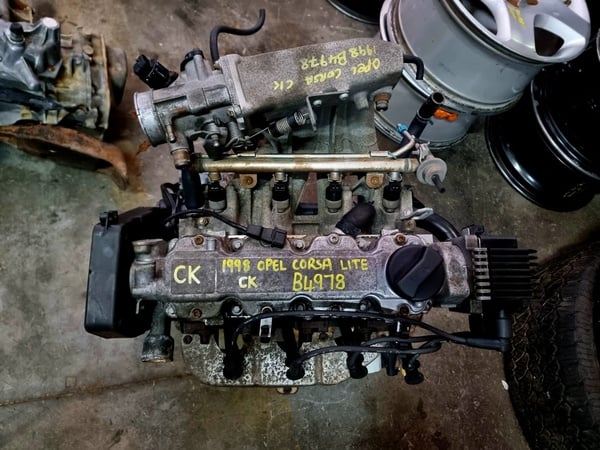Opel Corsa 1.4 Engine Price Breakdown: Discover High Quality Vehicle Parts Selections
Opel Corsa 1.4 Engine Price Breakdown: Discover High Quality Vehicle Parts Selections
Blog Article
Engine Acquiring Specialist Tips on Choosing the Right Engine for Your Particular Needs
Selecting the appropriate engine for your details requirements involves a complicated interaction of elements that go beyond simple horse power numbers. By diving right into the complexities of power versus effectiveness, evaluating gas ratings, and budgeting for long-term costs, one can genuinely maximize their engine option.
Power Vs. Effectiveness: Locating the Balance
When selecting an engine, it is important to strike a balance in between power and performance to meet your details demands efficiently. Power describes the engine's capacity to create power for propulsion, determining factors like velocity, lugging capability, and general efficiency - Opel Corsa 1.4 Engine Price. On the other hand, efficiency associates with just how well the engine utilizes gas to generate power, affecting aspects such as gas economic climate and environmental friendliness
Attaining the ideal equilibrium between power and efficiency is important due to the fact that an engine that is too powerful may eat extreme gas, bring about greater operating prices and unnecessary pressure on the environment. Alternatively, an engine that prioritizes effectiveness over power may lead to slow performance, especially sought after scenarios like towing hefty tons or driving uphill.
To make a notified decision, take into consideration variables such as your typical driving conditions, the designated use the car, and your personal preferences. By examining your requirements and top priorities, you can choose an engine that strikes the excellent balance between power and efficiency, guaranteeing optimum efficiency while reducing environmental impact and operating costs.
Understanding Engine Dimension and Kind
To further improve the option procedure of an engine that strikes the ideal equilibrium between power and performance, it is important to delve right into the intricacies of recognizing engine dimension and type. Engine dimension describes the total quantity of air and gas that can be pressed via the engine cyndrical tubes. It is usually measured in litres or cubic centimeters. Larger engine dimensions normally result in more power output yet can likewise result in lowered fuel performance. On the various other hand, smaller sized engine dimensions are often more fuel-efficient yet may compromise some power.
Usual engine types consist of inline engines, V engines, and rotating engines, each with its special benefits and drawbacks. Recognizing the interplay between engine dimension and kind is vital in selecting an engine that straightens with your specific needs and concerns, whether it be power, effectiveness, or a balance of both.

Consider Your Automobile's Requirements
Considering your automobile's demands is a fundamental step in the engine choice procedure to make certain optimum performance and capability. It is vital to assess variables such as the intended usage of the lorry, its weight, towing ability, and gas efficiency demands. As an example, if you are trying to find an engine for a sturdy vehicle that will certainly be made use of for towing, you will certainly require an effective engine with high torque capacities. On the other hand, if you are choosing an engine for a compact cars and truck mostly used for city commuting, fuel performance might be an extra crucial variable to think about.
If you frequently drive in uneven or hilly locations, a robust engine with good climbing up power will be needed. By lining up the engine specs with your automobile's needs, you can guarantee that your vehicle runs efficiently and meets your more helpful hints performance assumptions.
Reviewing Gas Efficiency Rankings
Assessing gas efficiency rankings is a critical element of selecting the right engine for your lorry, making sure expense savings and ecological sustainability. Fuel effectiveness scores, typically measured in miles per gallon (MPG) for gas engines or kilowatt-hours per 100 miles (kWh/100 miles) for electrical engines, show exactly how far a lorry can travel on a specific quantity of gas or power. Greater MPG or lower kWh/100 miles worths signify extra reliable engines, converting to lowered fuel prices and reduced carbon discharges.
Furthermore, contrast different engine choices within the same lorry course to identify the most affordable choice. Variables such as engine dimension, weight, the rules of aerodynamics, and hybrid or electrical capacities can all affect gas efficiency.
Budgeting for Long-Term Prices
Strategically intending for long-term expenditures is crucial when choosing an engine, ensuring monetary sustainability over the car's life expectancy. While the preliminary acquisition price of an engine is a substantial element, it is essential to consider the long-lasting expenses associated with upkeep, fixings, and fuel intake.
Furthermore, investigating the schedule and cost of substitute parts for the selected engine is essential in budget find more info planning. By thoroughly budgeting for these long-lasting costs and factoring them right into the decision-making procedure, people can pick an engine that not just fulfills their prompt needs yet also stays cost-efficient throughout its life expectancy.
Conclusion
Finally, selecting the best engine for your certain demands requires balancing power and effectiveness, look at this web-site recognizing engine dimension and kind, considering your lorry's demands, evaluating fuel efficiency ratings, and budgeting for lasting prices. By meticulously taking into consideration these elements, you can guarantee that you choose an engine that fulfills your demands and provides ideal performance for your car.
To even more improve the selection procedure of an engine that strikes the optimal equilibrium in between power and performance, it is important to dive into the details of understanding engine dimension and kind. Engine dimension refers to the overall quantity of air and fuel that can be pushed through the engine cylinders. Typical engine kinds consist of inline engines, V engines, and rotary engines, each with its special benefits and drawbacks. Recognizing the interplay between engine size and kind is crucial in choosing an engine that straightens with your particular demands and top priorities, whether it be power, effectiveness, or a balance of both.

Report this page